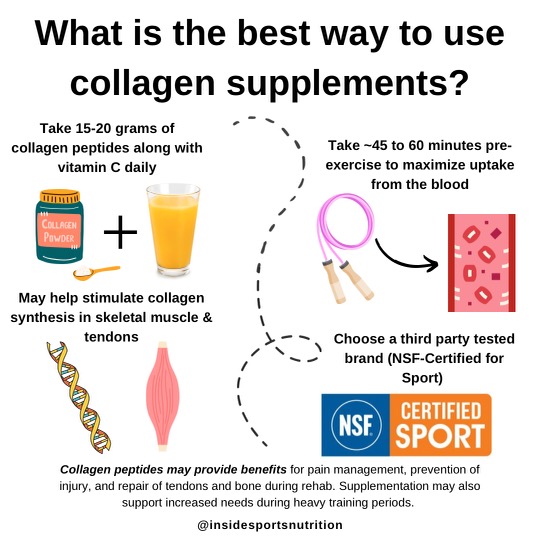Collagen is the most abundant protein in the human body and is predominantly found in the muscle, bone and connective tissue. ~80% of the body’s collagen is Type I and made of non-essential amino acids: proline, glycine, hydroxylysine, and hydroxyproline.
Collagen supplements are derived from animals (bovine, marine, poultry) and hydrolyzed into smaller peptides which are easily absorbed by the GI tract before entering the blood. Other sources of these amino acids are gelatin and bone broth, however they may not be as appealing for supplementation. Plasma levels of glycine decrease after endurance exercise, possibly due to increased uptake by musculoskeletal tissue. This suggests that glycine supplementation might support connective tissue synthesis and remodeling after exercise. Glycine content in dairy protein (whey, and casein) is relatively low compared to in collagen protein. The presence of vitamin C is important given its role as cofactor in the hydroxylation of proline and lysine to form the collagen helix.
Researchers have been investigating the role of collagen supplementation in both healing and prevention of tendon injuries. One study examined the use of gelatin (15 g) and vitamin C (50 mg) with jumping exercises and found an increase in type I collagen. Although more research is warranted, emerging research has also suggested that collagen peptide supplementation with vitamin C may benefit:
- pain management for tendonitis
- decreased joint pain and improved functionality when combined with rehab exercise,
- increased bone strength
- supporting increased needs during heavy training demands or when protein intake is inadequate
- repair of bone, skin, tendons during rehab from injury
- injury prevention
- Muscle damage and inflammation
If choosing to take a collagen supplement:
- Consume 15-20 grams along with ~ 50 mg vitamin C, daily. Some products will contain vitamin C, but if not the supplement can be paired with a vitamin C rich food (strawberries, orange juice). It is unknown whether additional vitamin C is needed if dietary vitamin C is adequate.
- Take the supplement 45 to 60 min pre-exercise to maximize uptake. Choose a third party tested (NSF-Certified for Sport) brand (Vital Proteins, Thorne, Momentous).
- Collagen supplementation may be more beneficial for masters athletes given the loss of collagen with age.

Leave a comment